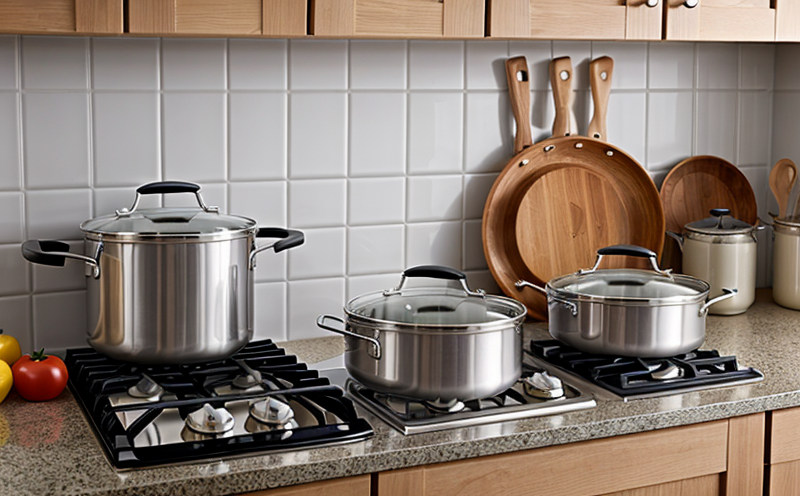Biodegradability Testing in Eco-Friendly Cookware
In today’s fast-evolving consumer landscape, sustainability and eco-friendliness have become key priorities for both manufacturers and consumers alike. Eco-friendly cookware is designed to be durable yet biodegradable, offering an alternative to traditional materials that are non-biodegradable and environmentally harmful.
Biodegradability testing ensures that these materials meet the necessary standards regarding their ability to decompose in natural environments within a specified timeframe. This process evaluates how quickly and effectively the material breaks down into harmless components without leaving behind toxic residues or polluting the ecosystem.
The importance of this test cannot be overstated, especially when considering the lifecycle impact of products that are intended for repeated use over many years. By conducting biodegradability tests early in development stages, manufacturers can identify potential issues and make necessary adjustments to improve their product’s sustainability credentials.
For instance, some eco-friendly cookware uses plant-based polymers or other bioplastics which require specific conditions to degrade properly. Understanding these conditions allows for more accurate predictions of how the product will perform under various environmental factors such as temperature, humidity levels, and exposure time.
Moreover, compliance with international standards like ISO 14855:2017 becomes crucial in ensuring that products meet global regulatory requirements. These guidelines provide a framework for measuring biodegradability scientifically and consistently across different regions and industries.
In summary, biodegradability testing plays an integral role in developing sustainable kitchenware by providing valuable insights into material performance throughout its lifecycle from production to disposal. It helps manufacturers create products that are not only functional but also environmentally responsible choices for consumers who are increasingly seeking greener alternatives.
Why It Matters
The significance of biodegradability testing extends beyond mere compliance; it directly impacts the environment and public health. When eco-friendly cookware fails to decompose appropriately, it can lead to soil contamination, water pollution, and increased waste management challenges.
For manufacturers, ensuring that their products pass rigorous biodegradability tests is essential for maintaining brand reputation and gaining consumer trust. Consumers are becoming more aware of the environmental footprint associated with everyday items like cooking utensils and pots. Brands that prioritize sustainability will find themselves better positioned in competitive markets where eco-conscious consumers drive sales.
From a regulatory perspective, governments worldwide are implementing stricter regulations aimed at reducing plastic waste and promoting circular economy practices. Meeting these standards through successful biodegradability testing not only avoids legal penalties but also opens doors to new market opportunities abroad.
In addition to environmental benefits, there are economic advantages too. Efficient use of resources during manufacturing processes leads to cost savings while enhancing product longevity appeals to cost-conscious buyers looking for long-term value from their purchases.
Benefits
- Increased Consumer Trust: Products that undergo thorough biodegradability testing build credibility among eco-conscious consumers, leading to higher customer satisfaction and loyalty.
- Enhanced Brand Reputation: Successfully passing biodegradability tests reinforces a company's commitment to environmental stewardship, attracting environmentally responsible customers.
- Compliance with Regulations: Ensuring compliance helps avoid costly fines and potential legal actions while fostering good standing within the industry.
- Promotes Sustainable Development: By prioritizing biodegradability testing, companies contribute positively towards achieving sustainable development goals set forth by international organizations like the United Nations.
Environmental and Sustainability Contributions
The process of biodegradability testing contributes significantly to environmental protection efforts. By assessing how quickly and thoroughly materials decompose, tests provide crucial data on minimizing waste accumulation in landfills.
This information assists manufacturers in selecting appropriate raw materials that can break down naturally without leaving behind harmful substances or microplastics which could enter the food chain or water systems.
- Reduction of Landfill Burden: Materials that biodegrade effectively reduce the amount of waste sent to landfills, helping to alleviate overcrowded facilities and associated environmental impacts. Minimization of Pollution: Ensuring proper decomposition prevents harmful substances from leaching into groundwater supplies or contaminating soil.





